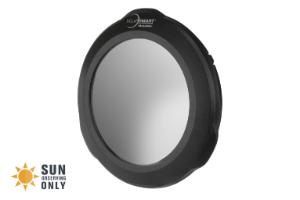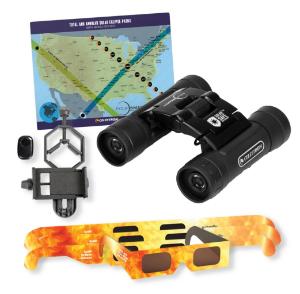Warnings, Rules, And Guidelines for Safe Solar Observing
Middle and High School
The wonders of the Sun have captivated humanity for centuries, and observing our closest star can be an awe-inspiring experience for your class. However, it is crucial that students learn to approach solar observation with the utmost caution and respect for the potential risks involved. We’ve compiled these guidelines to provide essential information and practical advice on safely observing the Sun, protecting your eyes, and ensuring an enjoyable and educational experience. Whether you are a seasoned astronomer or an enthusiastic beginner, these guidelines will equip you with the tools to explore the beauty of our solar system's powerhouse while safeguarding your eyes and equipment.
So, print and review these warnings, rules, and guidelines for safe solar observing with your students:
Never look directly at the Sun - even if it is low on the horizon - with the naked eye or with any optics without proper solar safe filters. Permanent and irreversible eye damage may result. Your vision could still be damaged even if you don't feel discomfort because there are no pain receptors in the eye. You can damage your eyes and not know it until you start having blind spots in your vision.
- Never use your optics to project an image of the Sun onto any surface. Internal heat build-up can damage the optics and any accessories attached.
- Never leave your optics unsupervised. Ensure an adult familiar with the correct operating procedures is always with your optics, especially when children are present.
- Never take a risk by using uncertified solar filters. Solar products must conform to and meet the transmission requirements of ISO 12312-2, Filters for Direct Observation of the Sun. EN 1836:2005 + A1:2007 (E) for an E15 Filter for the Direct Observation of the Sun and, AS/NZS 1338.1:2012, Filters for Eye Protectors. All EclipSmart Solar Safe products conform to these standards.
- Always check your solar filters for any damage or tiny holes before using them. Throw away the filter if any damage is detected.
- Do not use unsafe filters. Some examples include black-and-white and color negatives, exposed film, X-rays, smoked glass, neutral density filters, and polarizing filters. Stacking multiple pairs of sunglasses is also unsafe, no matter how dark the glasses are. Most items listed above transmit high levels of infrared radiation that can cause a thermal retinal burn and permanently damage your vision.
- Always check your solar filters for any damage or tiny holes before using them. Throw away the filter if any damage is detected.
- If using a solar filter on your telescope, use a certified filter that covers the entire front aperture. Always remove your telescope's finderscope or ensure its lens caps are secured, or concentrated sunlight will burn out the crosshairs and could even burn your skin if you are within range of the eyepiece!
- Never use a solar filter that screws into the bottom of your telescope's eyepiece. The glass in the filter could crack from heat buildup, allowing unfiltered sunlight to pass through and cause permanent damage to your eye.
- Never use a solar filter that is designed to be looked through (such as solar glasses) with your telescope. Never place this type of solar filter directly over your telescope or binocular eyepiece(s) to observe the Sun. The intense heat can burn right through your solar glasses.
List Credit: Celestron
Watching the Sun is fascinating, but it can be dangerous. Its ultraviolet and infrared rays can harm your eyes, causing permanent blindness. Protect your eyes by following guidelines and equipment instructions to safely enjoy the experience.
Interested in a free Eclipse facts poster? Follow the link below.
Recommended Products
[StartProductBlock]

Eclipse Glasses
Special-purpose solar eclipse glasses ISO 12312-2 approved lenses block harmful UV and IR light.
[EndProductBlock]
[StartProductBlock]

White Light Solar Filters
Turn a nighttime telescope into a daytime solar observing telescope. Solar Safe filter technology for protection from harmful UV and IR light and 99.999% of visible light.
[EndProductBlock]
[StartProductBlock]

Solar Safe Binoculars
EclipSmart Solar Binoculars are compact and easy to transport. Full, magnified view of the solar disk. Solar Safe filter technology for protection from harmful UV and IR light and 99.999% visible light.
[EndProductBlock]
